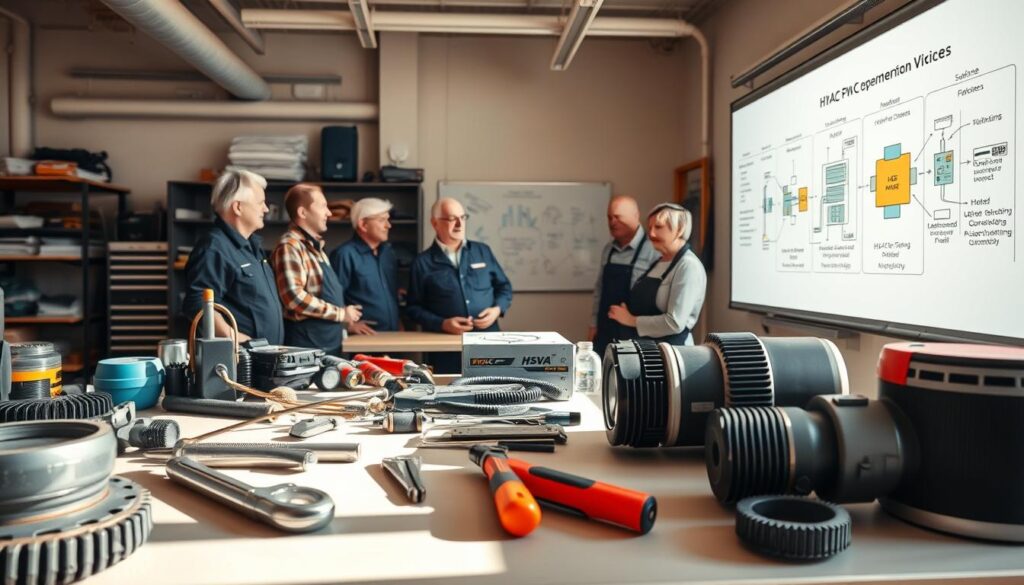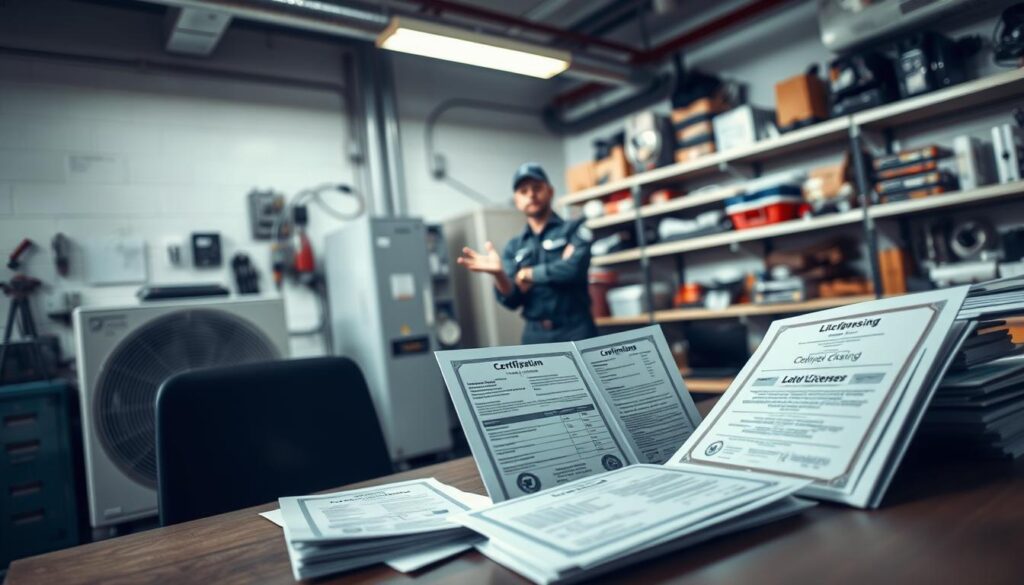Affiliate Disclosure
HVAC Guide Guys is a participant in the Amazon Services LLC Associates Program, an affiliate advertising program designed to provide a means for sites to earn advertising fees by advertising and linking to Amazon.
How Old Do You Have to Be to Work in HVAC? Are you curious if you’re old enough to start a career in heating, ventilation, and air conditioning? Knowing the minimum age to become an HVAC technician is a key step. It can lead to a rewarding career in this fast-paced field.

The HVAC world is full of exciting opportunities for those who love technical work. Most employers look for candidates who meet certain age and education standards. Knowing the age requirements can help you plan your career path.
Age requirements for HVAC technicians vary based on several factors. These include state laws, the type of work, and job duties. While there are general standards, specific employers and training programs may have their own rules.
Key Takeaways
- Most HVAC employers require candidates to be at least 18 years old
- High school diploma or GED is typically recommended
- Age requirements can differ by state and type of HVAC work
- Safety regulations play a critical role in age restrictions
- Technical training programs offer pathways for younger aspiring technicians
Table of Contents
Minimum Age Requirements for Starting an HVAC Career
Starting an HVAC career means knowing about age rules and legal stuff. Your path into this field depends on state laws and federal rules for young workers.
Looking into hvac career age rules shows big differences in states and work places. The legal age to start hvac jobs is usually 16. But, there are special rules for kids in this technical field.
State-Specific Age Limitations
Every state has its own rules for young workers in technical jobs. Some important points include:
- Minimum age requirements range from 16 to 18
- Parental consent often required for workers under 18
- Restricted work hours for younger technicians
- Additional safety training mandatory for young workers
Federal Labor Protections for Young Workers
The U.S. Department of Labor sets key rules for youth jobs in technical fields. These rules help keep young workers safe while they learn new skills.
Special Considerations for Minors
If you’re under 18 and want to work in HVAC, you face some big rules:
- Limited exposure to dangerous equipment
- Mandatory supervision by certified professionals
- Restricted work during school hours
- Additional safety certifications may be required
Tip: Many high schools offer vocational programs. These programs let students start HVAC training as early as 16 or 17. It’s a great way to get a head start in this exciting career.
Explore Our HVAC Shop
Looking for top-rated HVAC tools, parts, and accessories? Visit our shop and find the perfect solution for your needs.
Visit the ShopLegal Working Age Variations by HVAC Program Type
Exploring HVAC youth employment guidelines means looking at different program types. Each type has its own age rules, affecting when you can start your HVAC career.
Vocational programs let students in as young as 16. They offer a chance to start early in HVAC. These programs are designed to meet youth employment rules and prepare you for technical jobs.
- Vocational High School Programs: Age 16-18
- Technical School Enrollment: Age 17-19
- Apprenticeship Programs: Age 18-21
Apprenticeships offer a special way for youth to enter the HVAC field. You must be at least 18 to join. But, you get paid training and real work experience.
| Program Type | Minimum Age | Training Cost | Wage Potencial |
|---|---|---|---|
| Vocational Programs | 16 years | Low | Entry-level |
| Technical Schools | 17 years | Moderate | Developing |
| Apprenticeships | 18 years | Minimal | Progressive |
Knowing these differences helps young people plan their HVAC career. It ensures they follow industry rules and make the most of their education.
How Old Do You Have to Be to Work in HVAC?
Getting into the HVAC field means knowing about age rules and career paths. Your path into this exciting field depends on several important factors. These factors include age requirements and apprenticeship rules.
Most HVAC jobs need you to be a certain age and have some education. Employers and training programs have rules to keep everyone safe and help you learn.
General Industry Standards
The HVAC world has strict age rules to keep young workers safe and uphold high standards. Here are the age limits for starting jobs and apprenticeships:
- Minimum age: 16 years old for basic entry-level positions
- Preferred age for apprenticeships: 18-21 years old
- Full professional certification: Typically requires completion of training by age 22-25
Apprenticeship Age Requirements
HVAC apprenticeships are structured ways to become a technician. Knowing the age rules for apprenticeships is key to planning your career.
| Program Type | Minimum Age | Educational Requirement |
|---|---|---|
| Union Apprenticeships | 18 years | High school diploma/GED |
| Non-Union Programs | 16-17 years | Parental consent required |
| Technical College Programs | 17-18 years | High school completion |
Technical School Entry Requirements
Technical schools offer flexible ways to start HVAC training. Most schools accept students who:
- Have finished high school or got a GED
- Are 17-18 years old
- Can handle basic math and science
Pro tip: Explore HVAC chances early by joining vocational programs and internships in high school.
Explore Our HVAC Shop
Looking for top-rated HVAC tools, parts, and accessories? Visit our shop and find the perfect solution for your needs.
Visit the ShopEducational Pathways in HVAC for Different Age Groups
Exploring HVAC certification programs shows there are many educational paths for different ages. You can start your HVAC journey at any life stage. There are options for everyone, based on your needs and life situation.
Young professionals and those looking to change careers have many ways to get into HVAC:
- High School Vocational Programs
- Technical School Certificates
- Community College Degree Programs
- Apprenticeship Training
Age limits for HVAC certification programs vary. They depend on the program and school. Most welcome students:
- 16 years and older for entry-level training
- 18 years and older for advanced certifications
- No strict upper age limit for career transitions
“Your age should never be a barrier to pursuing a rewarding HVAC career.” – Professional HVAC Technician Association
Technical schools and community colleges offer flexible learning. Some institutions provide online and part-time options for different schedules and ages. These programs teach you the skills and knowledge needed for HVAC certification.
Remember, age is not as important as practical experience and dedication in HVAC. Each path has its own benefits for HVAC professionals at different stages of life.
Age Requirements for HVAC Apprenticeship Programs
Starting an HVAC apprenticeship requires knowing about age rules. It’s key for those eager to begin their HVAC career.
Apprenticeships are great for young people to learn HVAC skills. Each program has its own age rules, based on the type and rules of the organization.
Union Apprenticeship Requirements
Union apprenticeships have strict age rules. You usually need to be:
- At least 18 years old
- High school graduate or equivalent
- Physically capable of performing job duties
Non-Union Apprenticeship Options
Non-union programs are more flexible with age rules. Consider these points:
- Minimum age of 16 for entry-level positions
- Parental consent for minors
- Specific safety training for younger apprentices
Duration of Training by Age Group
Training time changes with age and experience. Here’s a table showing typical times:
| Age Group | Training Duration | Key Considerations |
|---|---|---|
| 16-18 years | 3-4 years | Limited work hours, additional supervision |
| 18-21 years | 2-3 years | More flexible scheduling, increased responsibilities |
| 21+ years | 1-2 years | Accelerated learning, prior experience considered |
When looking at apprenticeships, always check the age rules with each program and local laws. Each place has its own rules for working in HVAC.
Explore Our HVAC Shop
Looking for top-rated HVAC tools, parts, and accessories? Visit our shop and find the perfect solution for your needs.
Visit the ShopState Licensing Age Requirements for HVAC Technicians

Getting a license to work as an HVAC technician can be tricky. This is because each state has its own rules for young workers. These rules are part of the minor employment laws for HVAC trades.
It’s important to know the licensing rules in your state. Some states are strict about how old you must be to start. Others are more open to young people wanting to work in HVAC.
- Age requirements vary significantly by state
- Some states require specific certifications for minors
- Refrigerant handling often has separate licensing rules
For example, Massachusetts doesn’t license HVAC technicians like electricians or plumbers. Refrigerant handling is the main area where young workers need a special license.
| State | Minimum Age | Licensing Requirement |
|---|---|---|
| California | 18 | State Contractor License |
| Texas | 16 | Apprentice Permit |
| New York | 18 | EPA Certification |
When looking for a job, check the minor employment laws for HVAC trades in your state. These laws affect things like apprenticeships and the jobs you can do as a young technician.
Pro tip: Always check with your state’s labor department and HVAC licensing board for the most current requirements.
Youth Employment Opportunities in HVAC
Starting a career in the HVAC industry can be thrilling for young professionals. Knowing the age requirements to work in HVAC opens doors for students and young workers. They can explore technical trades with enthusiasm.
The HVAC field has many entry points for young people. There are clear paths for those wanting to become technicians. These paths help them gain valuable experience and skills.
High School Vocational Programs
Many high schools offer vocational training in HVAC. These programs are for students aged 16-18. They provide:
- Hands-on technical training
- Basic certification preparation
- Introduction to industry tools and equipment
- Networking opportunities with local HVAC professionals
Entry-Level Positions
Young workers can find entry-level jobs in HVAC. These jobs include:
- Apprentice assistant
- Warehouse support staff
- Customer service representative
- Equipment maintenance helper
Summer Training Programs
Summer internships and training programs are great for young people. HVAC companies offer these programs. They help students:
- Develop practical skills
- Understand industry standards
- Earn initial certifications
- Build professional networks
Exploring these opportunities can help young individuals start their HVAC career. They can meet legal and industry guidelines while doing so.
Explore Our HVAC Shop
Looking for top-rated HVAC tools, parts, and accessories? Visit our shop and find the perfect solution for your needs.
Visit the ShopAge-Related Safety Regulations in HVAC Work
Safety is key in the HVAC world, even more so for young workers. They face special rules to keep them safe while they learn.
These rules are in place to keep workers safe and avoid accidents. Employers must think about age limits when hiring and giving tasks to younger workers.
- Minimum age requirement is typically 16 years old for entry-level positions
- Restricted from operating certain heavy machinery until reaching specific age milestones
- Required to complete thorough safety training
- Must work under direct supervision of certified technicians
Knowing and following these rules is vital for your safety. Proper protective equipment and thorough training are non-negotiable for young HVAC workers.
| Age Group | Permitted Tasks | Safety Requirements |
|---|---|---|
| 16-17 years | Basic assistant roles | Mandatory safety gear, supervised work |
| 18-20 years | Limited technical tasks | Additional certification training |
| 21+ years | Full technical responsibilities | Advanced safety certifications |
Driving is a big part of HVAC work. Having a valid driver’s license with a clean record is key for young technicians to move up in their careers.
Safety isn’t just a requirement—it’s a commitment to protecting yourself and your future in the HVAC industry.
Career Progression Timeline by Age

Understanding how age affects your HVAC career is key. Age restrictions in the HVAC field can limit your career growth. But, you can plan your career to reach your full potentials.
Every age group has its own milestones in the HVAC world. Young ones start at the bottom, while older ones get into leadership roles.
- Ages 18-25: Entry-level technician positions
- Ages 26-35: Specialized technical skills development
- Ages 36-45: Leadership and management opportunities
- Ages 46+: Senior technical consulting and training roles
As you gain experience, your salary will grow. Technicians see a big increase in pay as they move up.
| Age Group | Career Stage | Average Salary Range |
|---|---|---|
| 18-25 | Apprentice/Entry-Level | $30,000 – $40,000 |
| 26-35 | Skilled Technician | $45,000 – $60,000 |
| 36-45 | Senior Technician/Supervisor | $60,000 – $75,000 |
| 46+ | Technical Consultant/Manager | $75,000 – $90,000 |
Your success in HVAC depends on learning and keeping up with new tech. Professional certifications and ongoing training can help you beat age-related career limits.
HVAC Certification Age Requirements
Knowing the age limits for HVAC certification programs is key for new technicians. It helps you plan your career and meet industry standards.
The HVAC world has important age and experience rules for different career stages. Your age and experience affect which certifications you can get.
EPA Certification Age Limits
The Environmental Protection Agency (EPA) has rules for handling refrigerants. To get the Section 608 certification, you need to:
- Be at least 18 years old
- Finish a required training program
- Pass a detailed exam
Industry-Specific Certifications
Each HVAC certification has its own age rules. Some major certifications include:
- North American Technician Excellence (NATE) Certification: You must be 18 or older
- HVAC Excellence Professional Level Certification: You need to be 18
- Refrigeration Service Engineers Society (RSES) Certification: Age rules vary by credential
Knowing these age limits helps you plan your career wisely. Start looking into certifications early to match your career goals.
Explore Our HVAC Shop
Looking for top-rated HVAC tools, parts, and accessories? Visit our shop and find the perfect solution for your needs.
Visit the ShopLegal Considerations for Underage HVAC Workers
Working in HVAC trades as a minor comes with strict rules and safety guidelines. Young people interested in HVAC need to know these laws. They protect the rights of young workers and keep the workplace safe.
The U.S. Department of Labor has clear rules for underage workers in technical fields. For HVAC workers under 18, there are important legal points to remember:
- Limited work hours during school days
- Prohibited from operating certain dangerous equipment
- Required supervision by certified adult technicians
- Restricted from performing high-risk installation tasks
Employers must check young workers for HVAC jobs carefully. They do this with background checks that include:
- Verifying age and work eligibility
- Checking educational status
- Ensuring compliance with child labor regulations
- Documenting parental consent
“Safety and legal compliance are key when hiring young workers in technical trades” – U.S. Labor Commission
Knowing these laws is vital for the safety and success of young HVAC workers and their employers. Proper training, supervision, and following the rules make a safe place for young HVAC professionals to learn.
Conclusion
Knowing how old you need to be to work in HVAC is key for those starting out. The age limit for HVAC jobs changes based on state laws, federal rules, and industry needs. You can start your HVAC career in high school or later, as an adult looking for a new path.
The HVAC field has many chances for people of all ages. Even though there are age limits, they’re to keep everyone safe and make sure skills are learned well. Schools, apprenticeships, and certifications help you get into HVAC, no matter your age or past work.
To succeed in HVAC, you need to know about state licenses, safety rules, and certifications. Success isn’t just about age; it’s about technical skills, a love for learning, and solving tough mechanical problems. The HVAC world is open to anyone who’s eager to learn and grow.
With the right planning and knowledge of HVAC job ages, you can have a fulfilling career. Look into local rules, find training, and move forward with your HVAC career goals.

